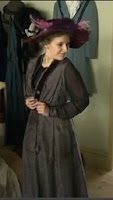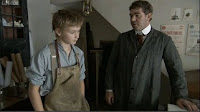Turn back time- The high street is joined this week by a new shop that reflects the growing importance of women in retail. Gill Cockwell, who operates her own dress making shop in Bristol will run the dress maker's shop. While the social historian makes a big deal about dress shops being owned and operated by women in the 1910's , they are indeed a fixture far earlier. What is fascinating about the Shepton Mallet shop through the week, is the fact that we see for the first time in the main stream, the fact that modern women below the age of 30 are flocking like bees to honey to places like this. They represent what the feminists call the third wave, and they themselves just call retro women. For more on these fascinating creatures, I strongly suggest you read Retro Woman Revolution.
 |
Armed with 2 new employees to help insure the highest level of customer service, the week starts out hopefully with everybody learning their madams ,sirs , master, miss and mistress. In the Polish language spoken by non yobbish persons, these appellations exist to this day. The other element that works it's way through the ep is the growing frustration of the women from last week, bubbling into the use of suffragette symbols and clothes. I think two of the women found it hardest to adapt, not having set aside modern attitudes for the time of the experiment. Had they done so they might have discovered what my grandmother knew. They had a lot of power that wasn't always obvious to the modern feminist revisionism of the era. Women were the transmitters of language, culture, values and a great deal of useful skills.
And speaking of skills, our modern master baker, has no clue about operating old fashioned ovens, is mystified by cakes and totally rooted in her own recipes and so has not allowed for the possibility that lard is as tasty or easy to use as butter. Rather than learn from books or asking one of the Chamber of Commerce, she cheats and buys butter and thinks she can make working class pudding when she's supposed to be making high tea. What should have been a walk in the park commercially speaking, became a disaster. For the record, my own Babcia(gran) and mother baked with lard. Cakes and pies came out tasty f lackey and lovely. She even feared potato bread as we see later on, a bread we had just a few days ago, home baked of course. Caroline the baker showed the effect of 60 years of systematic erosion in the womanly arts our grandmothers took for granted. This same problem crops up in a generational way as you see the younger the person , the less they are open to game as good food and the complete disappearance of the skills needed to prepare and cook the animals. One of the best or worse lines came from a mam who was with her young daughter on the verge of tears or nausea, I'm not sure which, said pointing to a rabbit, "Could you prepare that so it looks like meat " then turning to her daughter " It's ok you can just have some vegetables". Just where do these oiks think meat comes from??? Spineless disconnected modern parents too afraid to let the children know that most of what ehy eatr used to be alive.
Meanwhile near the butcher's shop, Michael the oldest son grows bored and sets off to sell rabbits and pheasant to the locals. Very enterprising for a lad who started this wanting to have nothing to do with the family business, while his father had in his eyes the light you see only when people are truly happy and fulfilled. At one point the groom comes in to see the preparation of the boar's head for the wedding breakfast. As it turns out, you don't eat the entire head, the skin is used to cover a variety of rich meats to be eaten once the centre piece is done being a decoration. Interestingly the young bride doesn't seem all that fussed about having a boar's head on the table, much to the relief of her future husband, though we learn she is a picky a eater. Perhaps she isn't as closed to food as she used to be.
Gill running the dressmaker's, has a blast selling corsets to young women and making the wedding dress for our bride. She also reminds us of the lost art of embroidery that most women used to do and that the whole family appreciated. Embroidery represents an art that allowed people to state their political feelings, tell the family history, and insure people knew which thing was theirs. Such elegance and refinement is about to die in Europe, with only one place remaining in England making lace and proper linen going the way of the dodo bird. I think Greg Wallace is wrong, hand made clothes can and should make a comeback. Especially in view of the fact the big manufacturing outfits in China are folding in the big bubble that is bursting as we speak.
Our iron monger now faces the real prospect of no one wanting his services any more. Seeing the need to prove he's still relevant, he heads to the forge using the baker's youngest son as hired help to run the penny bazaar while he crafts a mirror. This barter of labour for goods seems to have been a perfectly normal arrangement as children as young as 12 might be made to work in shops, this being the limit because of the law that insured you went to school from 7 to 12 . On the other scale of profit is the Grocer and his family, that prosper through the early parts of the week, never skipping a beat. Seems the residents of Shepton Mallet have come round to the idea of service with a smile and being made to feel like valued customers.
Had the Great War not come along to shatter this idyllic world, it's clear they would have sorted themselves out in the end I think. But in the 40th minute, call up papers come for all the men over 15, 60,000 shop workers have left work by 1915, 120,000 boy soldiers died . With the men and boys gone, the women step up and take control of the shops and young Michael runs his father's shop. It's not the only hardship, England imports 60 % of it's food and 80% of it's wheat. This means empty shelves, high prices, potato bread and women missing their men badly. Even the suffragette banners get put aside as the ladies get stuck in and hope their men come back. In 1918 140 of Shepton's men did not return, we aren't told of those maimed, but the notion that women were incapable of running a business was taken less seriously and married women over 30 got the vote. We know it's just a day but the lesson was not lost on the men or the women. War was hard on all of them and at the end of the day, they needed each other, family IS important after all.
What did the war do to Britain's people? Sainsbury's trained thousands of women to be grocers, men could not ignore the achievements of those who stayed behind. What did the week do for our families? Some learned they may consider a new path in life, and yet others realised they were seeing their partners in a new light and yet others continue to struggle away from the era that made life comfortable and the skills they now needed, apparently redundant. But the lesson of the week was mostly that we miss the idea of being treated as a valued customer, the modern person is in fact the old fashioned person who knows how to do many things. Versatility in one's skill set is the secret to not falling into the technological trap most of us have succumbed to.
Next week, the!930's! You can also visit the High Street Home page.









1 comment:
I enjoyed the road show today that goes with this series.
Good Food Shops
Post a Comment